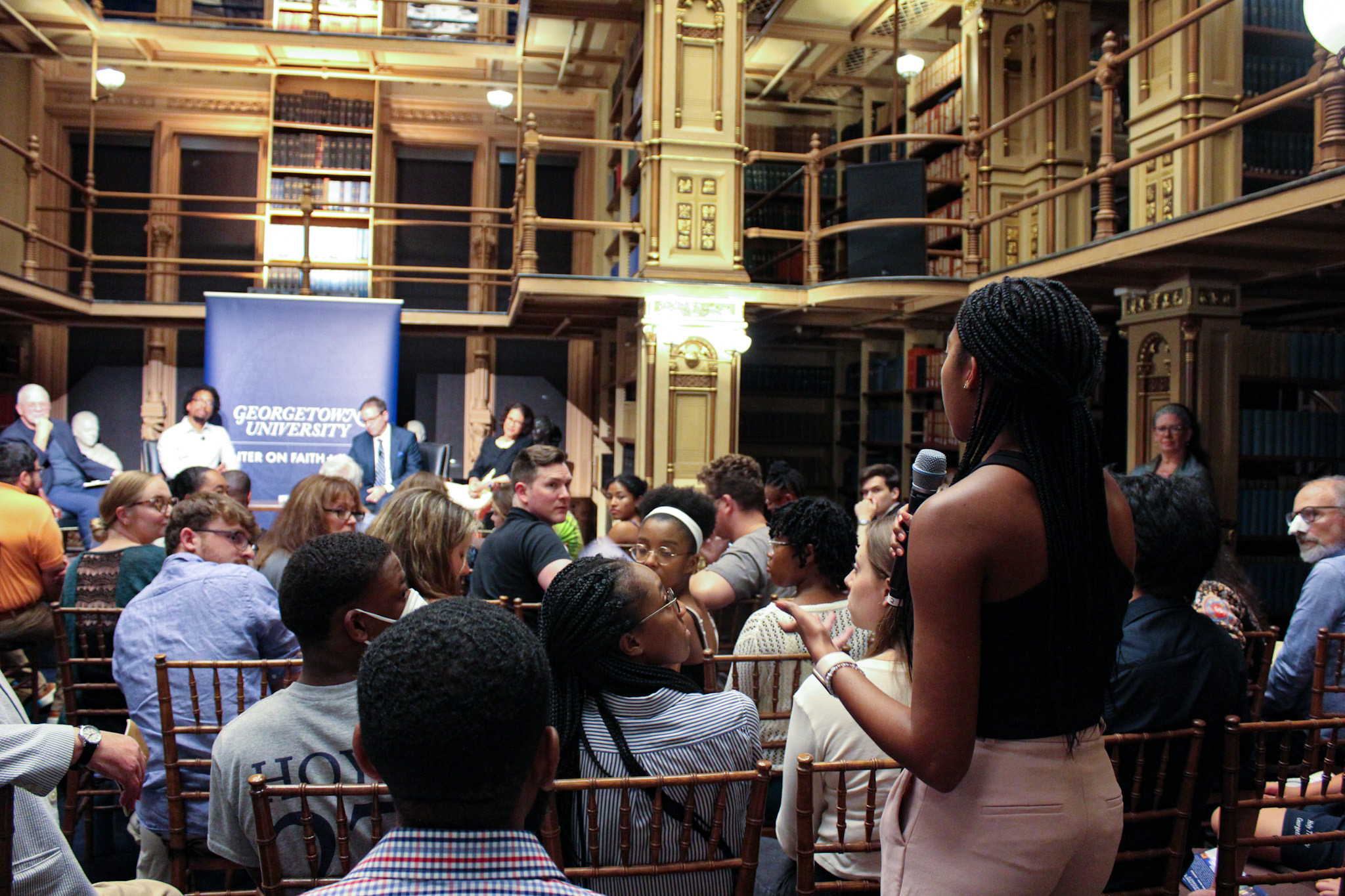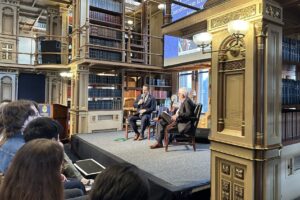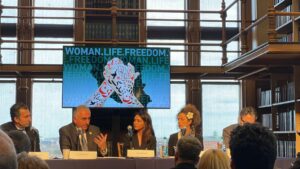President of the Public Religion Research Institute Robert P. Jones and other panelists spoke about Jones’s newest book, “The Hidden Roots of White Supremacy and the Path to a Shared American Future,” in Riggs Library on Wednesday. They discussed the book’s central themes— the connections between the U.S.’s colonial history, white Christian nationalism, and the myths we tell about U.S. history—as well as contemporary efforts to reckon with that history in today’s politically heated climate.
The event was moderated by Rev. Jim Wallis, director of Georgetown’s Center on Faith and Justice, with Washington Post commentator Jennifer Rubin and senior writer at The Atlantic Vann Newkirk joining Jones. It was Jones’s first promotional event following the book’s release on Tuesday.
The book discusses the “Doctrine of Discovery”— a 1493 edict from the Vatican that promised American land only to Christians. The doctrine set the stage for a violent, white Christian conquering of the Americas from Indigenous groups. Later, it helped bring about the genocide of Indigenous groups and, eventually, the transatlantic slave trade. The Catholic Church has not apologized for the edict.
In doing so, the book resituates the beginning of modern America from 1776 to 1493—not the year Christopher Columbus initially sailed across the Atlantic, but the year he sailed back to Europe to acquire additional soldiers, missionaries, and supplies with the purpose of stealing American land from Indigenous people, for white, Christian Europeans.
“I think if we change the beginning of the American story from 1776 to 1619, or as I’m suggesting, 1493, that really problematizes the status quo today,” Jones said, referring to the year the U.S. was founded and the year the first enslaved people landed in the American colonies, respectively.
To Jones, beginning American history in 1776 produces an “impossibly innocent” myth of U.S. history—one that neglects its white Christian nationalist roots. The embrace of this myth is a chronic issue in the U.S., but one that communities across the country are increasingly coming to terms with, Jones believes.
The book tells the stories of groups in Mississippi, Oklahoma, and Minnesota reckoning with their own racist pasts through memorialization. Each of those efforts, Jones told the Voice, was instigated by small groups of concerned citizens. In Mississippi, for example, descendants of enslaved people and other members of the community came together in an effort to remember the shared history of their county—specifically, the murder of Emmett Till.
“It’s easy to kind of throw up your hands and go, ‘What can we possibly do if it’s that big and that long?’” Jones said, reflecting on the hurdles facing communities that attempt to reckon with their racist pasts. “But I think the thing I’ve been convinced with from seeing people on the ground make a real difference is that it doesn’t take more than two or three people to get something moving.”
The panelists’ discussion covered not only Jones’s new book, but also connected the themes in it to more current issues of white supremacy. Just as early colonizers viewed themselves as a “chosen people” of American land, the panelists said, so did Jan. 6 rioters—many of whom brandished flags and other symbols of white supremacy and Christian nationalism as they stormed the U.S. Capitol in 2021.
“When you’ve gotten used to being the one with all the marbles, when anyone comes along to take just one, it’s a loss,” Rubin said during the panel discussion.
The panelists pointed to education as an essential part of accepting the U.S.’s white Christian nationalist roots. Major efforts have taken place in the last several years to reform American education to better reflect its truthful—but often murky and unflattering—history.
“I think we’re making some real strides. And I think that’s why we’re seeing the reactions against those strides that we’re seeing,” Jones said, referring to school board conflicts, book bans, and laws regulating teaching the U.S.’s racist history across the country.
Jones and the other panelists emphasized the importance of community-led action and historical truth-telling in reckoning with the U.S.’s past and the legacies of the Doctrine of Discovery. To do that, Jones suggests doing what he did when conducting research for his book: beginning with one’s own family history.
“You don’t have to be from the South, you don’t have to be evangelical or have roots in the Confederacy for this to be an issue,” Jones, who is white, said. “Start from where you are. Telling stories, learning your own family story— I think that’s very important.”
For people of color, sharing that family history is often very different.
“We could choose not to think about [our family histories] that much in a way that people of color or Indigenous people don’t really have that option,” Jones said. “It’s kind of forced upon them from the beginning.”




